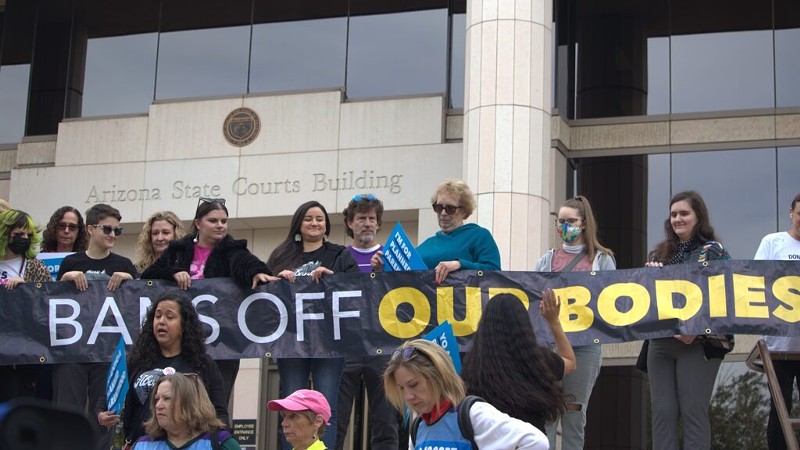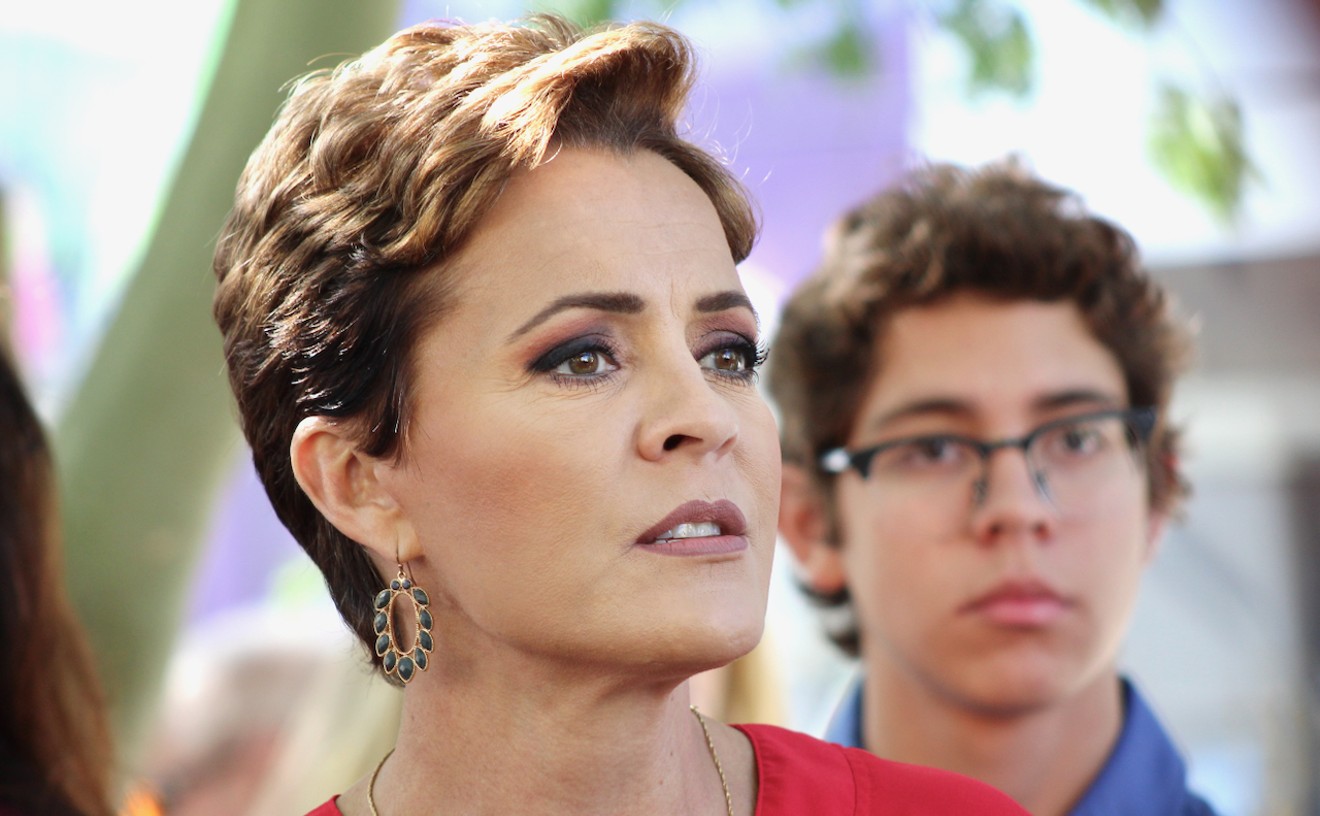Attorneys for Eric Hazelrigg, the medical director of a chain of anti-abortion clinics across the Valley, urged six of the state’s justices to restore a law from 1864 that forbids doctors from performing any abortions except those to save a patient’s life, or else face a 2 to 5 year mandatory prison sentence. (There are seven Supreme Court justices, but one of them, Bill Montgomery, abruptly recused himself from the case in November following reporting from the Arizona Mirror and The 19th detailing his past inflammatory comments about one of the plaintiffs in the case and his ardent anti-abortion positions.)
Meanwhile, Arizona’s attorney general and Planned Parenthood Arizona, which runs four of the state’s nine women’s health clinics that offer abortions, argued for the preservation of a lower court ruling that determined a 2022 law banning abortions after 15 weeks of gestation should reign supreme.
The high court didn’t indicate when its decision would be issued.
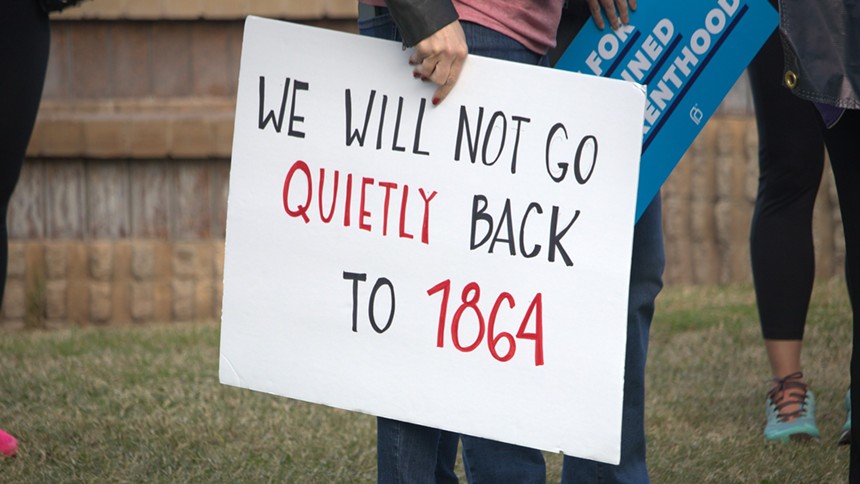
How did we get here?
In June 2022, the U.S. Supreme Court overturned Roe v. Wade, eliminating the constitutional right to abortion and giving the ability to restrict or outright ban the procedure back to the states. Just two months before that landmark decision, Arizona Republicans, who hold a majority in the state legislature, had approved a 15-week ban in anticipation of the federal court’s ruling. Without the protection of Roe, the ban was upheld as lawful where before it might have been struck down via a constitutional challenge.That law also included a provision stating that it didn’t repeal or replace any other laws restricting abortion, prompting then-Attorney General Mark Brnovich, a Republican, to go to court to reinstate the 1864 near-total ban. That ban had previously been blocked by an injunction based on the right to abortion secured by Roe, but a judge ruled that the injunction was rendered moot by the U.S. Supreme Court’s decision in Dobbs v. Jackson Women’s Health Organization that overturned Roe.
When the Civil War-era law was first blocked in 1973 by a woman seeking an abortion, the court allowed a doctor to intervene on behalf of the interests of all unborn children in Arizona. That position was filled by Hazelrigg when Brnovich went to court last year to implement the 1864 law anew, opening up an alternate avenue for appeal.
The trial court reinstating the 1864 ban led to chaos as clinics shuttered and women were pushed out of state for their reproductive healthcare. Planned Parenthood Arizona appealed the decision and secured a win in December 2022, when the state appeals court ruled to preserve elective abortions up to 15 weeks and determined that the 1864 law applied only to non-physicians. And while the election of Democrats to statewide offices was widely regarded as the end of the abortion debate — given that Brnovich’s successor, Democrat Kris Mayes, was adamant about her refusal to defend the territorial abortion ban — Hazelrigg petitioned the Arizona Supreme Court to reconsider the lower court’s decision.
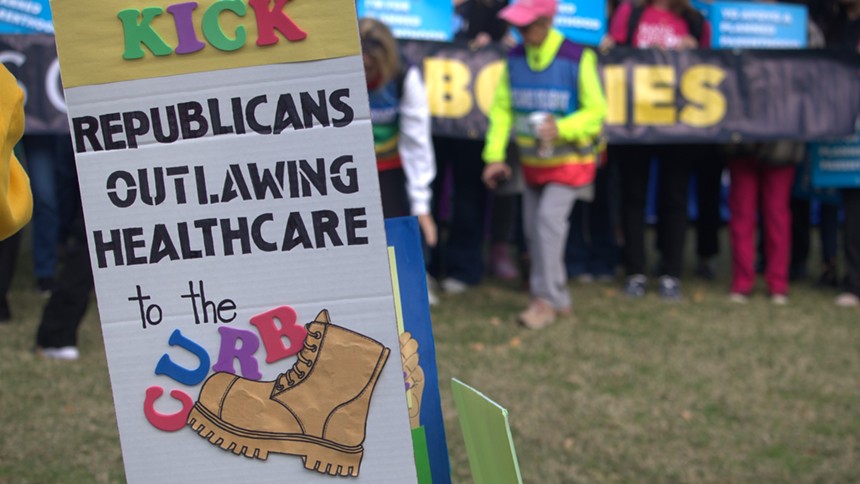
Hazelrigg: Only life-saving abortions are legal
Jake Warner, an attorney for anti-abortion legal firm Alliance Defending Freedom, which is representing Hazelrigg, told the justices Tuesday that the 1864 law and the 2022 gestational ban can coexist perfectly. The issue of harmonizing conflicting statutes was a key concern for the appellate court last year.The end result of combining the two laws, Warner said, is that only life-saving abortions will be legal. Rather than allow abortions until 15 weeks, the 2022 law modifies the 1864 near-total ban by defining the type of life-threatening situation that warrants an abortion. While the 1864 law prohibits abortions unless they’re performed to save the patient’s life, the 15-week ban forbids abortions after the 15-week deadline unless an “immediate” medical emergency that risks the patient’s life or irreversible bodily harm occurs.
“Here’s the straightforward way that all these laws fit together,” Warner explained. “Up to 15 weeks, the termination must be life-saving, after 15 weeks the termination must be immediately necessary to either save the woman’s life or to prevent significant and irreversible bodily impairment. There’s an immediacy requirement that kicks in at 15 weeks.”
That immediacy factor narrows the cases in which a woman can obtain an abortion, and Warner said the more stringent criteria is necessary to advance the state’s interest in protecting unborn children.
“Not all life-saving terminations are emergencies,” Warner added.
A woman in need of cancer treatment, who would ordinarily obtain an abortion, could wait to receive radiation treatments instead, Warner said. And certain heart diseases, while dangerous, don’t always merit terminating a pregnancy right away.
Justice Clint Bolick, a conservative appointed to the court by Gov. Doug Ducey, questioned Warner on whether his interpretation reflected the intent of the Arizona legislature when it crafted the 15-week law. The court’s primary responsibility is to determine and uphold the intent of lawmakers when interpreting laws, and if lawmakers truly intended to outlaw all elective abortions, Bolick asked, shouldn’t that be clear in the language of the 2022 law?
“Instead, what I find is the following language: ‘The legislature intends through this act to restrict the practice of non-therapeutic, or elective, abortion to the period up to 15 weeks of gestation’,” Bolick said, reading aloud from the legislative intent outlined in the law’s underlying bill. “What I hear you saying is there is no elective abortion. So, how do we follow the intent that the legislature actually told us to follow?”
Warner rebutted that the legislative intent was drawn up at a time when Roe was still in effect, and reflects only the expectation from legislators that their law would have to exist in a context which still legalized abortion to some extent. Their aim at that time, Warner said, was to restrict what they felt would be legally allowable, as the expectation was that the U.S. Supreme Court would simply uphold the 15-week law from Mississippi challenged in Dobbs, not strike down Roe completely.
The real window into the intent of Arizona lawmakers, Warner said, is in the non-repeal clause of the law that clarifies it doesn’t eliminate any other restrictions that came before it, including the 1864 near-total abortion ban.
“That purpose statement really does nothing more than acknowledge what the effect of Roe was, and say, ‘Look, we’re coming and we’re issuing the ceiling to this law,’” Warner said.
Vice Chief Justice Ann Timmer, who was appointed to the court by Republican Gov. Jan Brewer, expressed concern about the dissimilar punishments in the laws, pointing to them as a serious complication in combining the two. While the 1864 law mandates prison time for doctors who perform an illegal abortion, the 2022 law carries with it a class 6 felony and a revoked medical license.
Timmer grilled Warner on which punishment should take precedence if a doctor performed an elective, non-emergency abortion after 15 weeks and whether leaving the decision up to county attorneys represented a rights violation. The due process clause of the Arizona Constitution mandates that criminal laws be clear enough to prevent arbitrary enforcement and allow citizens to easily understand them.
“(Is) that not a due process problem for notifying physicians of the potential consequence for violating the law, if you’re depending on 15 different county attorneys’ discretion under which law they’ll prosecute?” she asked.
Warner argued that county attorneys are statutorily required to uphold the law, and deciding not to doesn’t render the law so unclear as to be unconstitutional.
“The fact that we have uncertain enforcement doesn’t make the law unenforceable,” he said. “There’s nothing unclear about the law itself.”
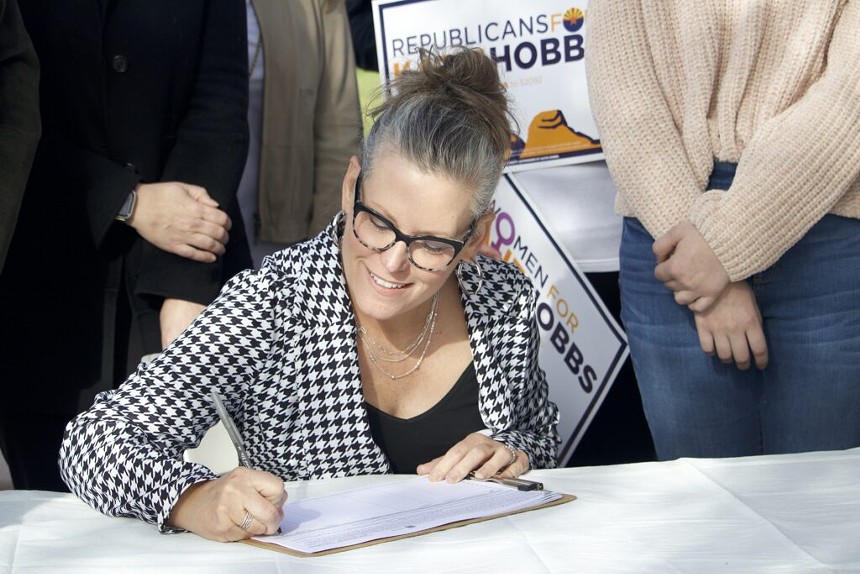
Planned Parenthood: Intent to outlaw nearly all abortions isn’t there
Andy Gaona, representing the state’s largest provider of abortion care, urged the judges not to do away with nearly 50 years of laws passed by Arizona lawmakers since abortion was defined as a right in Roe. Since 1973, Gaona said, lawmakers had every opportunity to pass a law demonstrating their intent to outlaw all abortions, but they never did. Implementing the 1864 law, therefore, would undermine their intent.“The legislature has enacted dozens of statutes that prescribe the who and the how and the when of that important health care procedure,” Gaona said. “But never once did the legislature signal any intent that most, if not all, of those subsequent enactments would become mere empty shells if Roe v. Wade were ever to fall.”
Hazelrigg’s legal team claimed in their appeal that a provision in the 2022 law, which asserts that it isn’t intended to guarantee any right to abortion despite allowing the procedure up to 15 weeks, effectively disqualifies any argument that the procedure should be preserved in any shape.
But, Gaona rebutted, that’s not how criminal laws work. While Planned Parenthood agrees that abortion has never been declared a right in Arizona, a behavior doesn’t have to be a right to be permitted.
“The legislature need only regulate conduct through the criminal code,” he said. “If a statute says the speed limit is 45, I don’t have a freestanding right to drive at 35 miles per hour.”
And the fact that the legislature criminalized abortions beyond the 15-week mark implies some intent to allow the procedure to continue before that stage.
“Criminal laws permit, authorize, allow — whatever you want to say — that which they do not criminalize,” Gaona said.
If the Arizona legislature’s intent was, in fact, to outlaw nearly all abortions by allowing the 1864 law to supersede the 2022 gestational ban, then it should have made that clear in the same way the Mississippi legislature did, Gaona said.
The 15-week ban passed in Arizona was almost an exact copy of the Mississippi version that eventually prompted the overturning of Roe — with one key difference. The Mississippi version included a provision asserting that an abortion which complied with the 15-week ban but violated other state laws regulating abortions was unlawful. Including a similar statement in the Arizona version would have immediately rendered any confusion moot, Gaona said.
Gaona warned the judges that Hazelrigg, Senate President Warren Petersen and House Speaker Ben Toma – the latter two who filed an amicus brief on behalf of the GOP-controlled legislature advocating for the 1864 law — were simply trying to push through an interpretation that failed at the legislative level.
“(Lawmakers) left out two key sentences of the construction provision from Mississippi, and had they done that, we probably wouldn’t be standing here before you,” Gaona said. “But, in effect, what the intervenors and the legislative leaders are asking you to do is to impose through an opinion that which they could not secure the votes in the legislature for.”
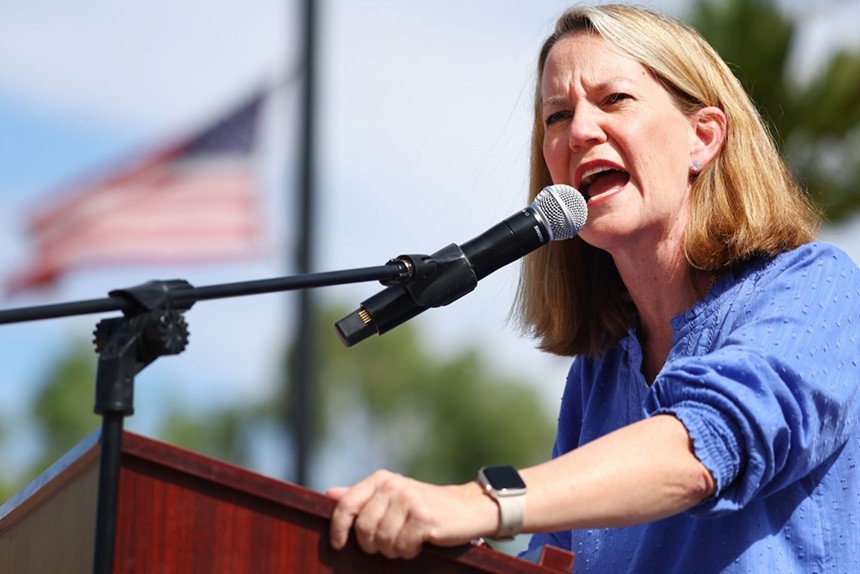
What’s next?
The judges offered no insight into when they would issue their decision, but it could come quickly. Because the panel is made up of an even number of judges after Montgomery’s recusal, the possibility of a tie exists. In that case, the decision from the appeals court preserving elective abortions up to 15 weeks would stand.Aadika Singh, a reproductive justice attorney with the Public Rights Project, told the Mirror in a Dec. 8 interview that an appeal would be complicated if the Supreme Court rules against reproductive rights advocates at this stage.
“This is the end of the line at the Arizona Supreme Court,” she said.
Current litigation from pro-reproductive rights parties, like Pima County Attorney Laura Conover, who Singh represents, is focused on affirming the appeals court’s reading of the statutes. If the Supreme Court finds in Hazelrigg’s favor, a future challenge would need to find a different angle altogether.
In the meantime, abortion advocates are looking towards the 2024 election for a more permanent solution. A coalition of reproductive rights groups crafted a ballot initiative, dubbed the Arizona Abortion Access Act, that could enshrine the right to abortion in the Arizona Constitution. But before voters have a chance to weigh in, the initiative needs to garner 383,923 verified voter signatures to make it onto the ballot, and it has until July 2024 to meet that goal.
Gov. Katie Hobbs, a Democrat and outspoken supporter of reproductive rights, released a video a day before the hearing calling on Arizonans to add their signatures to the campaign.
“If you’re as outraged as I am that there’s a possibility for a Civil War-era abortion ban to go into effect in 2023, then take action right now and sign the petition to put a right to abortion on our ballot next November,” she said in a press release. “There’s only one way to ensure extremist politicians can’t take away our freedom, and that’s by getting this measure on the ballot and then supporting it next November.”
Chris Love, a committee member for the Arizona for Abortion Access Campaign, expressed optimism about the decision from the state’s high court, but urged Arizonans to support the abortion act as a better safeguard of reproductive rights.
“While we are hopeful that the court will affirm the lower court’s judgment and reject the near-total ban, Arizonans will still need stronger protections for our reproductive freedom,” she said in an emailed statement. “Arizona for Abortion Access is committed to putting a constitutional amendment on the ballot in 2024 to ensure that abortion rights are preserved in our state for generations to come. We must act swiftly to ensure that every Arizonan can decide what is best for their own health and lives, without government interference.”
In another move to protect abortion access, Hobbs issued an executive order earlier this year stripping away the ability of county attorneys to prosecute abortion law violations and centering that power in the state Attorney General’s Office. That action all but guaranteed no doctors would be criminalized for violating abortion laws, as Mayes, the attorney general, has vowed not to do so.
On Tuesday, Mayes reaffirmed that promise, and while she acknowledged that Hobbs’ executive order could be challenged in the courts, she vowed to use her existing statutory power as the state’s top prosecutor to stop any attempts from county attorneys to punish doctors.
“If any county attorney attempts to prosecute, I will exercise supervisory power and seek to stop it,” Mayes said.
At least one county attorney, Yavapai County’s Dennis McGrane, has expressed an interest in upholding the 1864 near-total ban, going as far as filing an amicus brief in Tuesday’s case in support of Hazelrigg’s petition. Maricopa County Attorney Rachel Mitchell has said she would prosecute state laws based on evidence.
Democrats are hoping access to abortion will be a top issue for voters considering their presidential choice. On Tuesday, Phoenix Mayor Kate Gallego and Tucson Mayor Regina Romero, both members of the Biden-Harris campaign’s National Advisory Board and vocal reproductive rights proponents, issued a statement reminding Arizona voters of former president Donald Trump’s anti-abortion stances and warning that the election of MAGA Republicans would only further deteriorate access to the procedure.
“As Trump and MAGA Republicans push to go even further with a nationwide abortion ban, Arizonans won’t forget that Trump is responsible for putting our access to abortion services, bodily autonomy and health care on the line,” the two wrote. “Elections have consequences. We continue to grapple with the consequences of the last Trump presidency, we are seeing in real time the reality of why we cannot afford to let him back in the White House.”
This story was first published by Arizona Mirror, which is part of States Newsroom, a network of news bureaus supported by grants and a coalition of donors as a 501c(3) public charity. Follow Arizona Mirror on Facebook and Twitter.

